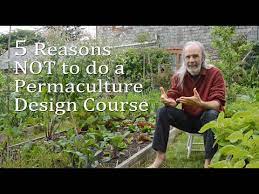The Benefits of Taking a Permaculture Course
Permaculture is a design system that integrates sustainable agriculture, ecological principles, and community building to create harmonious and regenerative environments. Taking a permaculture course can be a transformative experience that equips you with the knowledge and skills to design resilient systems that work with nature rather than against it.
Why Take a Permaculture Course?
Learn Sustainable Practices: Permaculture courses teach you how to cultivate food, manage water resources, build soil fertility, and create energy-efficient systems using sustainable practices that benefit both the environment and society.
Design Skills: By learning how to apply permaculture design principles, you can create productive and beautiful landscapes that mimic natural ecosystems, increase biodiversity, and promote resilience in the face of climate change.
Community Building: Permaculture courses often foster a sense of community among participants who share a passion for sustainability and regenerative living. You can connect with like-minded individuals and build networks that support your journey towards a more sustainable lifestyle.
Where to Find Permaculture Courses
Permaculture courses are offered by various organizations, permaculture institutes, farms, and educational institutions around the world. You can choose from introductory courses for beginners to advanced courses for experienced practitioners looking to deepen their knowledge.
Conclusion
Embarking on a permaculture course is not only an investment in your own education but also in the health of the planet. By learning how to design regenerative systems that promote biodiversity, conserve resources, and support thriving communities, you can play a vital role in creating a more sustainable future for generations to come.
Exploring Permaculture Education: Assessing the Value, Beginning Your Journey, Understanding the Timeline, and Defining Certification
- Is a permaculture design certificate worth it?
- How do I start learning permaculture?
- How long does it take to learn permaculture?
- What is a permaculture certification?
Is a permaculture design certificate worth it?
The question of whether a permaculture design certificate is worth it is a common one among individuals considering delving into the world of permaculture. Obtaining a permaculture design certificate can be highly beneficial for those interested in sustainable living, regenerative agriculture, and ecological design. The certificate not only provides you with a solid foundation of permaculture principles and practices but also opens up opportunities for networking, further education, and hands-on experience in the field. Ultimately, the value of a permaculture design certificate lies in how you choose to apply the knowledge and skills gained from the course to create positive change in your own life and within your community.
How do I start learning permaculture?
To start learning permaculture, the first step is often to enroll in a permaculture course. These courses are designed to introduce you to the principles and practices of permaculture, providing a solid foundation for your learning journey. You can find online courses, workshops, and in-person classes offered by permaculture institutes, community organizations, and educational institutions. Additionally, reading books, watching documentaries, attending local permaculture events, and connecting with experienced practitioners can also help you immerse yourself in the world of permaculture and start applying its principles in your own life and surroundings. Remember that learning permaculture is a continuous process of observation, experimentation, and adaptation as you work towards creating sustainable and regenerative systems.
How long does it take to learn permaculture?
The duration it takes to learn permaculture varies depending on the depth of knowledge and practical skills one aims to acquire. Introductory permaculture courses may span a few days to a couple of weeks, providing a foundational understanding of permaculture principles and design concepts. For those seeking more comprehensive training, advanced permaculture courses or certification programs can range from several weeks to months of study and hands-on practice. However, true mastery of permaculture is an ongoing journey that involves continuous learning, experimentation, and application in real-world contexts. Ultimately, the time it takes to learn permaculture is a personal journey shaped by individual goals, dedication, and commitment to sustainable living practices.
What is a permaculture certification?
A permaculture certification is a credential awarded to individuals who have successfully completed a permaculture design course (PDC) that meets the standards set by recognized permaculture organizations. This certification signifies that the individual has gained a comprehensive understanding of permaculture principles, ethics, and design practices. It demonstrates their ability to apply these principles to create sustainable and regenerative systems in various landscapes and contexts. A permaculture certification is often sought after by those looking to pursue careers in sustainable agriculture, landscape design, community development, and environmental stewardship.

